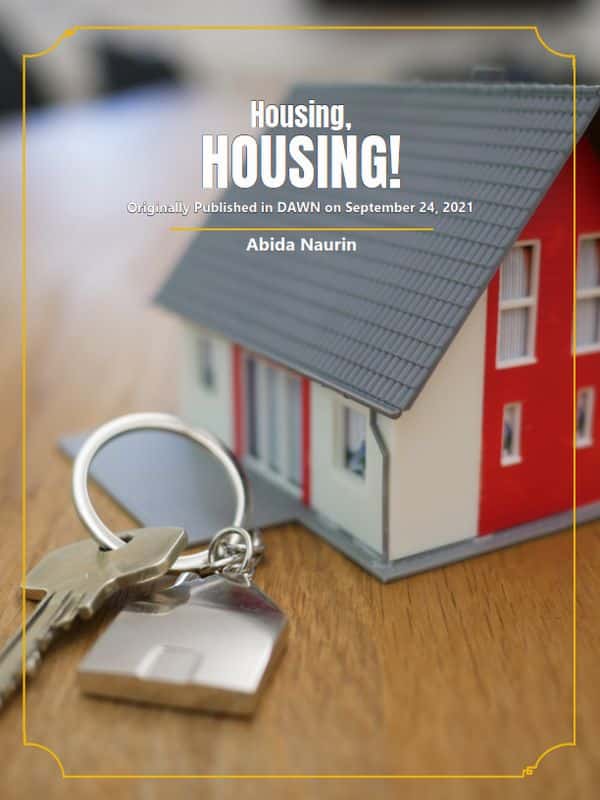Housing, Housing! (Discourse Vol 3, Issue 3)
What is the problem with our cities? Can these tiny geographical locations be termed as cities, as burgeoning housing societies are encroaching the city spaces more than ever? Who is going to stop this unguided fascination with lavish housing madness? Cities are shrinking, housing societies are sprawling? Does this mean economic activity is also being squeezed? Let me explain. Cities are powerhouses of growth, innovation, and prosperity. Yet, in Pakistan, research on cities management is scarce.
Dr. Nadeem ul Haq, the Pakistan Institute of Development Economics (PIDE) vice-chancellor, has been investigating the land model maintained by societies such as DHA Lahore, in which land is created by the public sector and handed to officials as a kind of compensation for service and the like. This is a hindrance to the development of competitive real estate markets. DHA Lahore was originally intended for army officials, but it quickly became a public housing society. Society was always intended to be a prestigious area, but it has become much more than that; collateral of growing urbanization. Gentrification has essentially taken away any area that was previously available to the upper-middle-class or middle-class aspirants. As a result, the nominal space has reduced even further.
The issue raised by this understanding is: why is the government able to get away with it? A famous British economic geographer Prof. David Harvey, has an answer. He claims that “quality of urban life has increasingly become a commodity for those with money,” successfully insulating people from the disparities at play. This permits communities to maintain their exclusive ethos because, according to Zukin, “Pacification by Cappuccino” keeps them engaged. This smart expression is used to describe how materialism keeps people entertained and diverted from actual concerns, and this is especially true in form of housing societies in Pakistan.Perhaps a literal pacification by cappuccino is at play with gentrified coffee shops in every sector, blinding inhabitants to the difficulties within and the distinct reality that exists and is maintained firmly outside the society. In Pakistan’s context, the vast wealth divide is “indelibly inscribed into the physical patterns of our cities, which are progressively becoming cities of fortified shards of gated enclaves and private• public places maintained under continual surveillance,” as Prof. David Harvey describes. This portrays housing society accurately and may be utilized to comprehend why such a culture survives.
Dr. Durre Nayab, Joint-Director at PIDE, recently wrote a PIDE Policy viewpoint on “The Assumed Shortage of Housing in Pakistan”. For the past ten years, the rallying cry in politics, the media, and donor-funded research have been “We are short of 10 million housing units.” Given the average household size of well over six people, this equates to approximately one-third of the population living in poverty. Do we witness such a large number of people living on sidewalks, roadside, beneath bridges, or in any other open space? Thankfully, the answer is no! We can’t figure out where this massive housing shortfall of ten million people came from. Worst of all, the
government relies on this estimate without ever questioning its accuracy. Regrettably, the policy has been built on this premise, and a large-scale public housing endeavor has been launched at tremendous expense.
Dr. Haq, recently also wrote a Twitter thread on the issue. The points mentioned are briefly explained here. Pakistan is perhaps the only country where housing societies exist on such a scale. They’re the result of the British passing down a PLOT culture to us. Those that were faithful to the colonial authorities would be given land as a gift. Corporate is a legal structure designed to assist poor farmers in banding together to do tasks that would be more difficult if they were working alone. Soon after the petition was filed, officials began forming housing societies under the cooperatives law. Pakistan is a very strange country in the sense that every government organization is into real estate development. City administrations run by District Management Group (DMG) have through history forbidden real estate high-rise and mixed-use construction inside cities. Since we continued the British tradition of gifting plots to govt officials’ suburban development was favored on basis of housing societies. It is a scheme for self-enrichment at the cost of the suckers who buy into those societies. It is time to allow high-rise and mixed-use are liberalized. It is time government including governor houses move out of cities leaving commerce to take over. Not allowing high-rise and city center redevelopment will slow down country development.
The PIDE Reforms Agenda 2021-22, focuses upon reforming almost every area that directly or indirectly influences economic growth. Cities are seen to be the driving force behind economic development. Dense, high-rise, mixed-use, and inclusive cities are conducive to economic development. Work, home, markets, school, hospital, and entertainment are all conveniently located in these cities. These cities produce knowledge spillovers on the one hand and lower transaction costs on the other by concentrating economic activity. This is a favorable climate for innovation, which is necessary for economic progress. The existing regulatory structure prohibits the establishment of such cities.
The PIDE Agenda also aims for revisiting the regulatory framework around city planning, construction rules, automobile usage, and public spaces, among other things, to release communities that maximize economic activity. To make true progress toward the rightto housing in Pakistan, we must rethink our unhealthy, unequal, and toxic relationship with the land and establish an urban development model that prioritizes our economic, social, and ecological needs over unbridled profit. We need city libraries, proper school buildings, footpaths, cycling lanes, studio apartments, offices, and shopping in our neighborhood. Finally, the PIDE suggestion that local universities and think tanks be active in policy, policy research, and policymaking should be taken seriously by the government. Nothing should be brought to the policy table without first being properly evaluated. Our experience has shown us that relying on consultants without domestic oversight has been expensive far too frequently. Let’s reclaim our cities!




